Iraq crisis: Kurdistan’s female fighters take on Isis
- Published
Shaimaa Khalil meets members of an elite female unit as they prepare to go to the frontline
Kurdish Peshmerga fighters have moved into parts of northern Iraq abandoned by the army in the face of an advance by jihadist-led rebels. The BBC's Shaimaa Khalil met members of an elite female unit as they prepared to go to the front line.
Morning assembly is in full swing at a military facility on the outskirts of Sulaimaniya, a city in the autonomous Kurdistan Region.
The troops look serious and focused despite the scorching heat of the Iraqi summer.
Standing straight in their fatigues with Kalashnikovs on their shoulders, this looks no different than any other training camp.
But it is the long hair tied back in a bun under caps, and the hint of make-up on some faces, that spells out the difference.
Ready for battle
This female unit of the Peshmerga - the Kurdistan Region's security forces - is undergoing intense training.
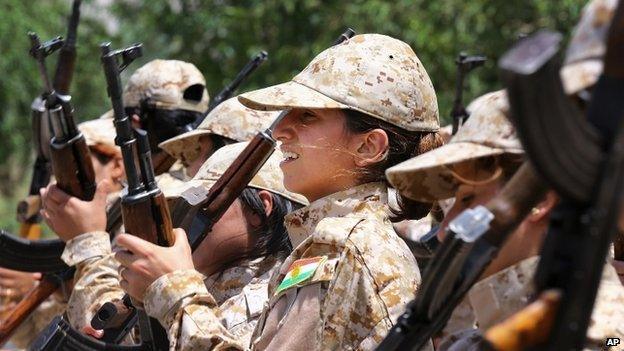
The Peshmerga say that they are determined to protect Kurdistan and the Kurdish people
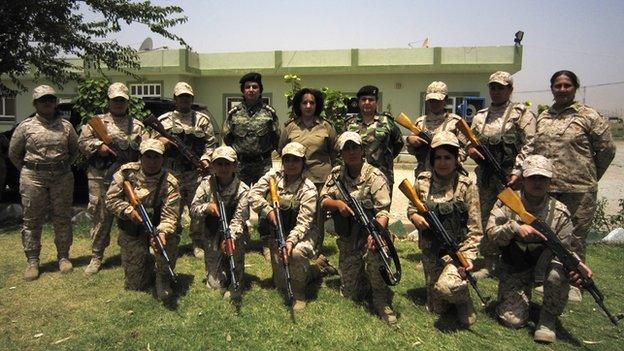
The women will be part of a mission to secure the city of Kirkuk and its surrounding oil fields
Some of its members are getting ready to go to the front line to fight militants from the jihadist Islamic State in Iraq and the Levant (Isis).
The unit commander, Col Nahida Ahmed Rashid, says the unit was formed in 1996 to fight loyalists of former President Saddam Hussein.
It is made up of several hundred fighters, all volunteers. Few have seen combat, but many have been telling their commander they want to fight since Isis captured large swathes of northern and western Iraq last month.
Col Rashid says that her female troops have been training daily and are ready.
"They've been trained with SWAT teams and with the special forces. Some have already fought alongside their male colleagues on the front line and I'm sending others to Kirkuk soon. I was in Kirkuk myself recently."
'Areas of conflict'
The Peshmerga have been instrumental in securing the Kurdistan Region.
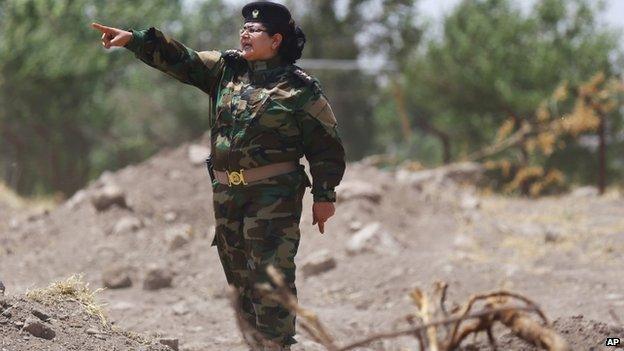
Col Nahida Ahmed Rashid says the unit is ready for combat
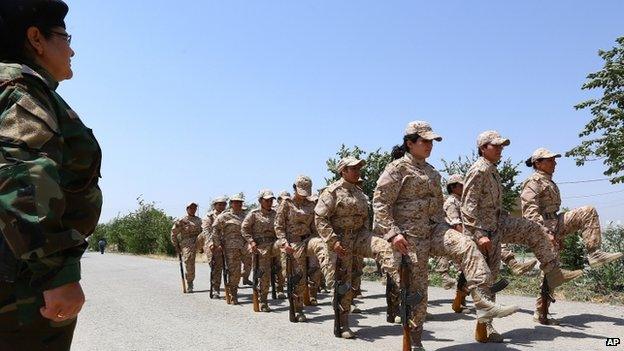
Families are supportive of the decision of the women to join the Peshmerga, Col Rashid says
Over the past month, they have also moved into disputed areas abandoned by Iraqi security forces during the Isis advance.
They have also recently seized control of oil production facilities at Bai Hassan and Kirkuk - the female Peshmerga will now be part of a mission to secure the city and its surrounding oil fields.
"They've taken up arms and gone to battle to protect Kurdistan, but also to say that there's no difference between men and women," Col Rashid says.
"A lot of women are volunteering to fight with us at the moment," she adds. "They join because they want to defend other women in areas of conflict."
Capt Mujdat al-Hameed, who led the day's training, is about to head off to Kirkuk.
She is a mother of three and says both her children and her husband are proud of what she is doing.
Supportive
One of the women in her unit is Awas Tawfiq. She is also about to head to the front line.
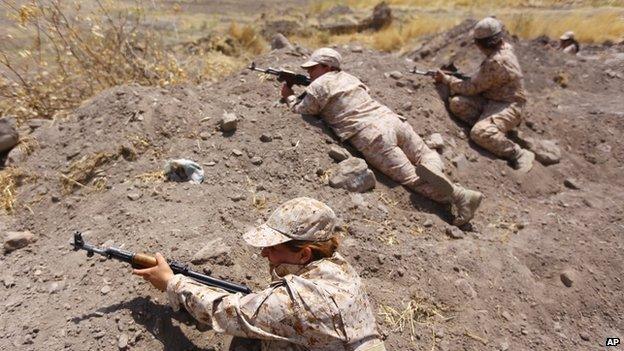
Many people in Kurdistan believe the region owes much of its safety to the efforts of the Peshmerga
"I'm very happy - I've been training for eight years for this," she says. "I'm not afraid, I know I'll be defending my land, I'm very excited to go."
Ms Tawfiq is a divorcee and a mother of two teenaged boys.
She spends two days a week at the military camp and the other four with her children.
She says they know she is fighting for a good cause and are very supportive.
Many people in Kurdistan believe the region owes much of its safety to the efforts of the Peshmerga.
Col Rashid says families are quite supportive of the decision of their daughters and female relatives to join the force.
"I have a daughter - she's 10 years old - and when she sees the videos of Isis attacks on Facebook and on the internet, she tells me: 'Please mum, when you go to fight on the front line, please just take me with you.'"
